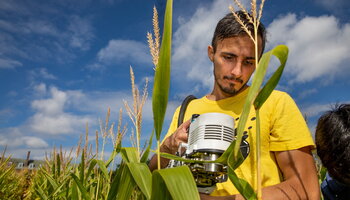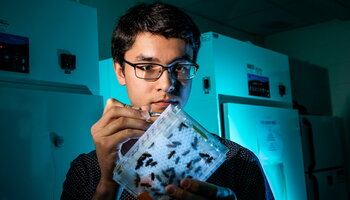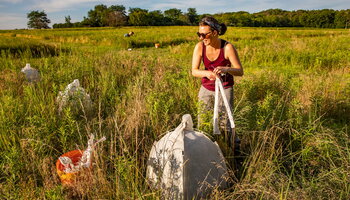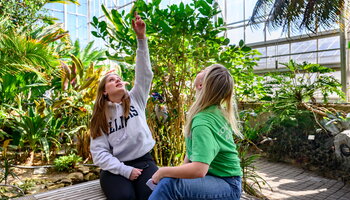IB majors study how the different components of life interact, from molecules through global cycles. Our courses and curricula focus on problem-solving, collaborative learning, and communication skills across the content areas. An IB major prepares students in genetics and evolution, anatomy and physiology of plants and animals, ecology and behavior and molecular biology. After completion of the core sequence in IB, students complete the required additional approved coursework by either taking a variety of courses or specializing in such areas as health professions, biotechnology, biodiversity and conservation and environmental sciences.

Major in IB
Discover how a major in Integrative Biology can prepare you for careers in health while also building a strong foundation in research, environmental science, and conservation. Click below to learn more and apply today!

Major in IB Honors
Explore Integrative Biology Honors to deepen your preparation for health focused careers through advanced coursework, close faculty mentorship, and enhanced opportunities in research, environmental science, and conservation. Click below to learn more and apply today!

Major in BSLAS + MS in IB
Accelerate your path toward pre-health careers by earning both a BSLAS and MS in Integrative Biology, gaining advanced training, research experience, and interdisciplinary skills that also prepare you for leadership in research, environmental science, and conservation. Click below to learn more and apply today!

Minor in IB
Enhance your pre-health goals or expand your scientific perspective by adding a School of Integrative Biology minor that builds valuable knowledge and skills in research, environmental science, and conservation. Click below to explore minors and get started today!
Additional Opportunities
IB plus Teaching Licensure
"IB has given me ample opportunities to learn how to be a great teacher. Not only was I taught the curriculum well, but I got to observe some of the best teachers in action. Plus, everyone is very helpful when it comes to reaching your goals." - Kristyn Klein, alumnus
Your work and extracurricular activities indicate that you enjoy explaining ideas or have an interest in contributing to the improvement of our schools. If your passion is getting others excited about biology, teaching may be the path for you.
To become certified to teach biology in a public middle or high school, you can major in IB and earn teaching licensure through the Secondary Education Minor.
* Denotes course with laboratory component.
Introductory Courses
- IB 150 Organismal and Evolutionary Biology
- MCB 150 Molecular and Cellular Basis of Life
Core Biology Courses
- IB 202 Physiology*
- IB 203 Ecology*
- IB 204 Genetics*
- IB 302 Evolution*
Additional advanced courses totaling a minimum of 14 hours at the 300- to 400-level are required. Course selection from the list of Courses for IB Major Advanced Hours must include:
1) One course from two of the following three areas:
- Area I: Organismal and Evolutionary Biology
- Area II: Behavior, Ecology, and the Environment
- Area III: Integrative Anatomy, Physiology, and Molecular Biology
2) One course with a laboratory and/or field component
Supporting Courses
- STAT 212 Biostatistics
- MATH 220 or 221 Calculus
- CHEM 102 General Chemistry I
- CHEM 103 General Chemistry I Lab
- CHEM 104 General Chemistry II
- CHEM 105 General Chemistry II Lab
- CHEM 232 Elementary Organic Chemistry
- CHEM 233 Elementary Organic Chemistry Lab
- PHYS 101 College Physics*
- PHYS 102 College Physics*
Secondary Education Minor Courses
- EDUC 201 Identity and Difference in Education
- EDUC 202 Social Justice, School, & Society
- CI 401 Introductory Teaching in a Diverse Society
- CI 403 Teaching a Diverse High School Student Population
- CI 404 Teaching and Assessing Secondary School Students
- CI 473 Disciplinary Literacy
- EPSY 201 Educational Psychology
- EPSY 485 Assessing Student Performance
- SPED 405 Gen Educator’s Role in SPED
- EDPR 442 Educational Practice in Secondary Education
Additional Requirements
- GEOL 107 Physical Geology
Select one:
- ASTR 100 Perspectives in Astronomy
- ASTR 210 General Astronomy
Details and Admission
For more detail on the Teaching Biology program and admission to the program, please visit:
http://catalog.illinois.edu/undergraduate/education/minors/teacher-education-secondary-school/
https://education.illinois.edu/programs/undergrad/programs-degrees/ci-sec-ug
For Additional Information
Email: las-teach@illinois.edu
Council on Teacher Education
Individual Plan of Study (IPS), Entomology
Our department has a long tradition of excellence in undergraduate education in entomology. Although never numerous, our undergraduate alumni have achieved distinction; recent graduates include in their ranks two winners of the Entomological Society of America Undergraduate Achievement Award and a Churchill Fellow. With over a million species, insects are the most diverse terrestrial organisms on the planet; moreover, insects arguably have a greater impact on human health and well-being than any other class of organisms. These impacts mean that the science of entomology has applied aspects that are not always easily accommodated within traditional life science boundaries or, indeed, within the College of Liberal Arts and Sciences.
Entomology is currently available as an IPS major, or Individual Plan of Study. For more information on the IPS program, please read this information from the College of Liberal Arts and Sciences, or view a sample Entomology IPS curriculum. Graduates in our IPS can find entry-level positions in research at universities or in research, development and technical sales in agrochemical, seed, and biotechnology companies, in state or federal cooperative extension service or experiment stations, in federal regulatory agencies, in zoos, museums, corporate farms, or nurseries, in integrated pest management consulting firms, in sanitary inspection service, in mosquito abatement programs, and in conservation and natural heritage non-governmental agencies. As well, an undergraduate concentration in entomology is excellent preparation for admission to graduate programs in entomology and allied disciplines as well as for admission to professional programs (including medical school; one of our recent undergraduate alumni, after working as a laboratory technician after graduation in a life science laboratory was admitted to medical school at UIUC).
The faculty within our department and in our graduate program (spanning four Colleges on the campus) have historically been extremely supportive of undergraduate research. Independent research is a key component of the entomology IPS and we stand eager to provide opportunities and mentoring. Our acting department head, Andrew Suarez, works personally to insure that our IPS students can gain admission into courses they need and can facilitate their interactions with an entomology community on campus and at the Illinois Natural History Survey that exceeds 3 dozen in number. This is an outstanding opportunity for motivated students and we pledge our support to accommodate their interests, which, as entomologists ourselves, we understand and relate to with great enthusiasm!